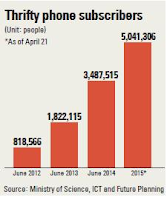Friday, May 8, 2015
Learning from Korea's world-leading mobile commerce
Given that South Korea has the fastest, most extensive mobile broadband networks and the highest penetration of smartphones in the world, it should come as little surprise that mobile shopping is rising exponentially here. (click on the accompanying graphic to see a full size version) As noted in a recent report by the McKinsey Group,more than two thirds of South Koreans own a smartphone, "... compared with 47 percent of Americans, 57 percent of Australians, and 52 percent of Britons. South Koreans are also big users of their smartphones, with sales of goods purchased using mobile devices jumping more than fourfold since 2012 to about 10 trillion won, or $9.8 billion." The mobile commerce market in Korea today represents nearly one third of all web-based sales. Clearly, mobile commerce is one of many areas where Korea serves as an interesting test-bed for other markets around the world.
Tuesday, May 5, 2015
All books e-books by 2015?
While doing a routine web search this afternoon, I ran across a 2011 article in the The Christian Science Monitor in which I was quoted to support the prediction that all textbooks in South Korea would be e-books by 2015. (click on the accompanying graphic to see a full sized version) It is now 2015, so I am obliged to inform you that all textbooks in South Korea are not yet e-books. I stand by my prediction, quoted in the article, that “South Korea’s transition to a totally networked society has profound implications for the publishing industry.” However, it appears that teachers, administrators and students at all levels of education have different preferences and fall into different segments when it comes to the digital transformation or disruption. Personally speaking, although I have written a number of academic books and monographs, I do not long for the smell and texture of high-quality paper, at least for my research-related reading. Instead, not possessing a photographic memory of what I wrote some years ago, I prefer the capability to search for words and phrases that an e-book provides, not to mention the added benefits of cloud based access to material as I move around our Incheon Global Campus, Korea, the Asian region, or the world. The printed books would simply be too heavy to bring along, and I don't mean intellectually heavyweight!
"Affordable" phone market grows!
As reported in the Korea Joongang Daily and other media, the market for "affordable" mobile phone service provided by mobile virtual network operators, experienced continued healthy growth last year. According to the Korea Joongang Daily article, "More users are flocking to thrifty phone providers that rent network space from Korea’s largest mobile carriers as the government regulation on subsidies for smartphones has caused phone bills to surge amid a tough economy. According to the Ministry of Science, ICT and Future Planning, the number of thrifty phone subscribers surpassed the 5 million mark, with its market share hitting a new high of 8.8 percent. The latest findings are based on records as of April 21." (click on the graphic to see a full size version)
"In 2011, the Korea Communications Commission (KCC) authorized smaller businesses to provide wireless communications services. Called mobile virtual network operators (MVNOs), the smaller vendors offer telecom services that slash monthly phone bill by 20,683 won ($19.20) compared to regular service, the ministry said. That translates into savings of more than 240,000 won per year, 57 percent cheaper than the service offered by Korea’s largest mobile carriers - SK Telecom, KT and LG U+."
While affordable phone services initially appealed to older people, a younger demographic is currently turning to these services. "The Science Ministry cited subscribers to the cheaper service offered by Korea Post to highlight the trend. “Those in their 30s and 40s form 32.2 percent as of April 21,” the ministry said in a statement. “And the number has consistently increased.”"
"In 2011, the Korea Communications Commission (KCC) authorized smaller businesses to provide wireless communications services. Called mobile virtual network operators (MVNOs), the smaller vendors offer telecom services that slash monthly phone bill by 20,683 won ($19.20) compared to regular service, the ministry said. That translates into savings of more than 240,000 won per year, 57 percent cheaper than the service offered by Korea’s largest mobile carriers - SK Telecom, KT and LG U+."
While affordable phone services initially appealed to older people, a younger demographic is currently turning to these services. "The Science Ministry cited subscribers to the cheaper service offered by Korea Post to highlight the trend. “Those in their 30s and 40s form 32.2 percent as of April 21,” the ministry said in a statement. “And the number has consistently increased.”"
Saturday, May 2, 2015
Al Gore on "The reality of the climate crisis and road forward for humanity"
I'm teaching a new course at SUNY Korea this spring on ICT for development (ICT4D), so the recent speech by former U.S. Vice President Al Gore as part of the Haas School of Business' Dean's Speaker Series at U.C. Berkeley caught my attention. Two themes that run through my course are the challenge of environmental sustainability, on the one hand, and the possibilities presented by new digital networks and information and communication technologies (ICT) on the other. Gore's speech in California was a sharp reminder that these two themes cannot be thought of separately. The vantage point of the course I'm teaching is that of South Korea's recent experience of ICT-led development, since this country managed to harness the power of the digital network revolution more successfully than any other developing nation to date for socioeconomic development. I strongly recommend the video embedded with this post. The substantive part of his speech starts at about 11 minutes 30 seconds in.
Subscribe to:
Posts (Atom)



